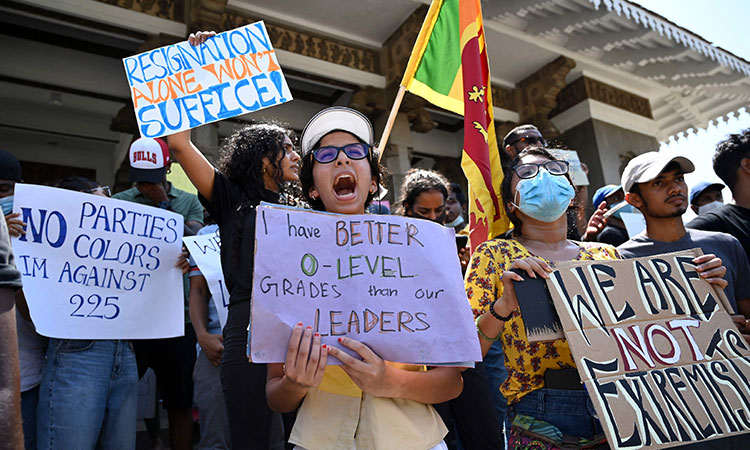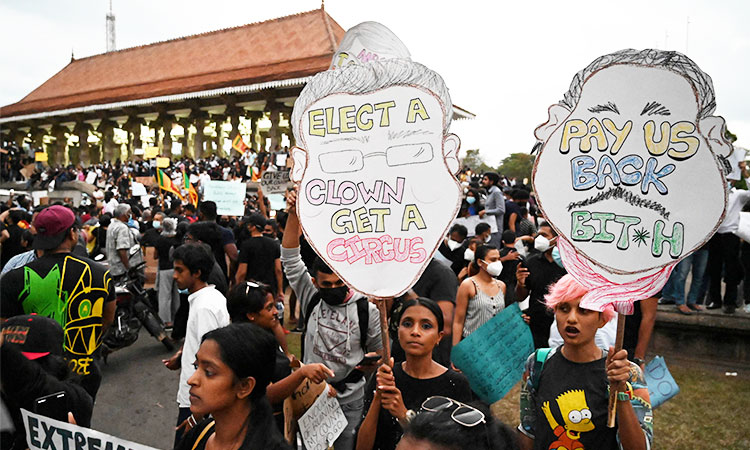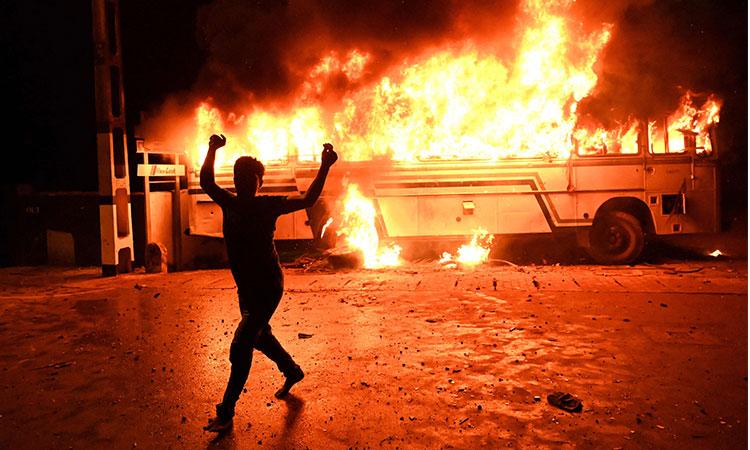UPDATES
SRI LANKA
Economists ask for a debt moratorium to exit crisis
The leaders of eleven parties have asked President Rajapaksa for an interim government to adopt new policies to cope with a shortage of basic goods. Sirisena's Sri Lanka Freedom Party left the ruling coalition. Four main Buddhist groups call for the government to step aside.

Colombo (AsiaNews) – The leaders of an eleven-party alliance that has the majority in the Sri Lankan parliament have asked President Gotabaya Rajapaksa to form an interim government to adopt new policies as a first step to resolve the country's economic crisis. This follows the resignation of every cabinet minister in the wake of countrywide protests.
Political analysts agree that a new interim government should not follow the policies that have aggravated the current crisis, but implement concrete solutions to deal with high food prices, shortages of food as well as fuel, gas and electricity and essential medicines.
The main cause of the current crisis is the lack of dollars in the state's coffers, economic analysts told AsiaNews. Like most countries of the world facing similar economic crises, loans and interest payments should be delayed through a moratorium policy for a period of five years.
Had this been done instead of repaying a US$ 6 billion loan, money would have been used to obtain essential goods to alleviate the country’s suffering.
Some left-wing parties, including the Lanka Sama Samaja Party (LSSP), believe the government should not seek assistance from the International Monetary Fund (IMF), as this would only lead to further debt.
Recently, former Prime Minister Ranil Wickramasinghe, leader of the United National Party (UNP), denied reports suggesting that he was asked to form a national unity government.
According to UNP sources, the only solution is a national consensus with a caretaker government of all parties under the Chief Justice to organise elections as soon as possible.
According to government sources, representatives from the Sri Lanka Freedom Party (SLFP) led by former President Maithripala Sirisena met with President Gotabaya Rajapaksa on Monday for urgent talks, but nothing came of them.
The SLFP has decided to leave the ruling coalition and its members now sit separately in Parliament.
For his part, President Rajapaksa, who discussed the crisis with 132 MPs from his coalition, asked all political parties in Parliament to offer their help in finding solutions to current economic challenges. He also appointed four ministers to conduct government business until a full cabinet is appointed.
The leaders of Sri Lanka's four major Buddhist groups also wrote to President Rajapaksa, presenting six proposals to resolve the economic crisis, including the formation of an interim government.
Meanwhile, protests continue in various parts of the country with larger crowds, which now include professionals, artists and students. In addition, protests are being reported among Sri Lanka communities around the world.
Sri Lankan lawyers hold massive protest as country in abyss of economic crisis
Colombo [Sri Lanka], April 5 (ANI): Sri Lanka is currently in the abyss of an economic crisis and amid this, a large number of lawyers staged a massive protest in front of the Attorney General’s Department on Tuesday in the Hultsdorph area in Colombo.
The demonstration, which commenced near the Aluthkade Magistrate’s Court, later proceeded towards the Attorney General’s Department, reported Colombo Times.
The lawyers are protesting the Attorney General’s move to withdraw certain lawsuits and also against the soaring prices of commodities that have gravely affected the day-to-day lives of the general public.
A protest letter with president Gotabaya Rajapaksa regarding the economic crisis in the country was officially lodged by the Bar Association of Sri Lanka, as per the news portal.
Amid the unprecedented economic crisis in Sri Lanka, the leader of the Opposition, Sajith Premadasa has called for abolishing the Executive Presidential system.
Sri Lanka is battling a severe economic crisis with food and fuel scarcity affecting a large number of the people in the island nation. The economy has been in a free-fall since the onset of the COVID-19 pandemic.
The country is also facing a foreign exchange shortage, which has, incidentally, affected its capacity to import food and fuel, leading to the power cuts in the country. The shortage of essential goods forced Sri Lanka to seek assistance from friendly countries.
On Sunday, 26-member Sri Lankan Cabinet Ministers submitted resignations amid rising public anger against the government over the economic crisis.
Meanwhile, the 36-hour long curfew that was imposed on Sri Lanka on Saturday evening at 6 pm was lifted on Monday morning at 6 am but the country is still under a state of emergency.
(ANI)
Sri Lankan flag does not 'protect' protesters from military, lawyers say
AFP Sri Lanka
As Sri Lankans protesting the island's economic crisis clashed with security forces, a message circulating widely on Facebook and WhatsApp claimed that military law prevented soldiers from shooting at demonstrators holding the national flag because it would be a "war crime". However, Sri Lankan legal experts warned that there was no law to protect protesters carrying the flag.
"Please have the national flag with you when participating in all protests in Sri Lanka," reads a Sinhala-language Facebook post from April 3 shared more than 700 times.
"If possible, take a photo of it and keep it with you. The Sri Lankan military cannot shoot at you while you carry the national flag."
"According to the Army Act and the oath they have taken, it's tantamount to betraying the nation. Furthermore, as per national and international military law, it's a war crime. This is on behalf of the safety of all those committed to dissent."

The post refers to "international military law", presumably meaning the Geneva Conventions, a set of rules ratified by 196 states that seek to reduce suffering in war.
Street protests have gripped Sri Lanka in recent weeks as demonstrators blocked main roads across the country over the worst economic crisis since independence from Britain in 1948.
Police fired tear gas and water cannon at hundreds of protesters trying to storm the home of President Gotabaya Rajapaksa on March 31, demanding he resign over severe shortages of essentials, sharp price rises and crippling power cuts.
Rajapaksa later declared a state of emergency, giving sweeping powers to security forces to arrest and detain suspects for long periods without trial.
Facebook posts encouraging protesters to carry a national flag for "protection" were also shared here and here. AFP also found the claim circulating on WhatsApp.
Some social media users appeared to believe the posts shared genuine advice.
"Very good and valuable advice. Sharing for everyone's use," one person commented.
"Bless you for educating us, will spread the news so all those protesting or who are planning to participate can follow this great advice," another wrote.
'No extra protection'
However, legal experts said the claim was false.
Sri Lankan attorney-at-law Prabodha Rathnayake said there was no regulation in national or military law that said security forces could not shoot at a person holding the national flag.
"The few citations relating to the national flag are found in the Constitution and in trademark laws on the permitted commercial use of the flag," he told AFP.
"There are no clauses which prohibit the military from shooting at a person bearing the national flag, and none declaring it as an act tantamount to treason."
Luwie Niranjan, attorney-at-law and consultant at Sri Lanka's Center for Policy Alternatives, also said the advice was incorrect.
"The flag doesn't give you any additional protection," he told AFP. "But the military or police shooting an unarmed civilian who is engaged in a peaceful protest would be an offence under the normal law."
"Outside a war situation, the general law applies, and shooting unarmed civilians engaging in nonviolent protest would amount to murder," he said.
The right to protest peacefully is enshrined in Article 14 (1) (b) of Sri Lanka's Constitution, which says that "every citizen is entitled to the freedom of peaceful assembly".
AFP found no mention of the purported law mentioned in Facebook posts in the Sri Lankan Army, Navy and Air Force Acts.
AFP Sri Lanka
Sri Lanka opposition rejects unity offer, demands president resign








No comments:
Post a Comment